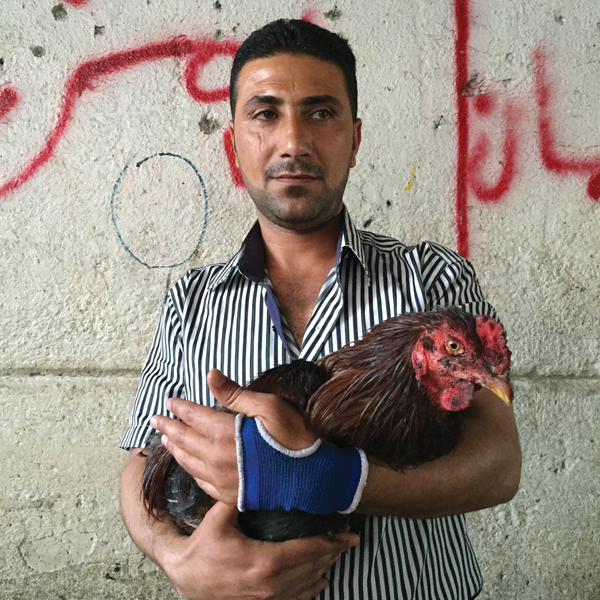While on assignment in Iraqi Kurdistan last spring, Scholar contributing editor Neil Shea wandered into several bazaars, where he discovered merchants who specialize in all manner of creatures, both domestic and exotic. Shea photographed them and began writing a collection of nonfiction prose poems to accompany his images. He counts Baudelaire’s Paris Spleen and Jean Follain’s A World Rich in Anniversaries among his influences. With poems and images, Shea says he is trying “to convey some deeper sense of momentary ‘truth,’ what poet Elizabeth Alexander called moments that stop you amidst the stream.”
Rooster
Sulaymaniyah, Iraq

It’s too much work, the rooster. He’s away at the front too often, fighting ISIS. Twenty days on, 10 days off. No time to care for it, sometimes no money. Since the war began, pay doesn’t come like it used to. So on Saturday afternoon Bahman Omer stands beneath a bridge in the bazaar, asking 100,000 dinar for a fighting cock with an unblemished record. There have been only three fights, but a champ is a champ, and look at that face—comb of ink and blood, eyes of coal and amber. The bird is unnamed. With hawklike talons and tall as a four-year-old child, it paces through the market’s ammonia stink, undisturbed by crying children or the flamingos bunched nearby, still as scarecrows, fading pink to gray. Omer, too, is unlike other men here. He trades in violence, luxury. His day job as hero is a selling point. He agrees to be photographed and gently lifts the rooster, cradles him, smooths down a rebellious feather. A crowd gathers. They ask questions of breeding and temperament. The price rises with every answer. My Kurdish translator suddenly decides it’s all very sad. She’s living through her third war, and such moments now come more often. Something about the way he holds it, she says. The fighter so calm in his arms.
Wolf
Kirkuk, Iraq

In a pet shop below the old citadel, the boy rolls up a sleeve, reveals a few small shining scars. He points to the gurg, the wolf, and says, “He did this.” Tugs up a trouser leg, shows more. Points. “Him.” For $500 the wolf can be mine. “From Iran.” Another $300 will buy the young ostrich chained up out front, near the monkeys and hedgehogs. I consider it. I have the money right here. On a hot morning very soon, you may find me heading south through Kirkuk’s severed neighborhoods, through checkpoints, leading an ostrich and a wolf. I will free them near the front line. Near the desert. Who would stop me? Not Kurds. Not Arabs. Only rich men buy such creatures, only insane ones buy two at a go. The boy points toward a black satin snake, coiled in a tank, and some kind of lizard in a water bottle. He pours the lizard into my hand. It has no legs. It glides across my palm and twines itself around my finger, a living ring. The boy says something, but it’s hard to hear over the gargling peacocks. Dust swirls in the air. Guinea pigs are squealing. A deer kicks at metal bars. The boy gives up on words and points, points, points. On the wall hangs a black muzzle. To go with the wolf. “Yes,” I tell him. I make the universal motion. “I’ll take them all.” This is how you’ll know me. American. Hopeful, tangled in leashes. Stumbling through a city of cages.

